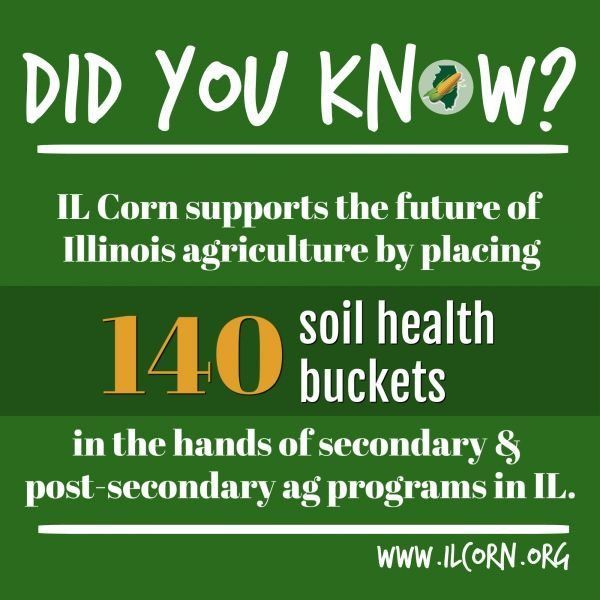IL Corn Partners with WIU in Soil Bucket Program for Third Year

For the third year in a row, the Western Illinois University School of Agriculture is partnering with the Illinois Corn Marketing Board (ICMB) to provide programming for high school agriculture classes across the state.
Through the Soil Health Bucket program, 90 schools receive a five-gallon bucket of supplies for evaluating soil functions and a comprehensive curriculum for engaging students in employing the interacting impact of soil type and soil management. Topics covered in the curriculum include water filtering and storage, nutrient provision and cycling and conversion of crop residues into soil organic matter.
The first year of the program, in 2018, an ICMB grant funded 40 buckets. The grant funding was increased in 2019 to include 50 more classroom buckets.
"Over this three-year period, this project will have placed a Soil Health Bucket into 140 different agriculture programs across the state of Illinois," said WIU School of Agriculture Director Andy Baker. "This curriculum project is helping agriculture instructors at the secondary and post-secondary levels to teach students about basic principles of soil health and sustainability. We appreciate the continued support from the Illinois Corn Marketing Board, and its members, in this educational endeavor."
The WIU program is run by Associate Professor of Agriculture Joel Gruver, who said its goal is to provide every secondary and post-secondary agriculture program in Illinois with a bucket and to "foster a science-informed and youth-led dialogue within agricultural communities across Illinois about the benefits of soil health enhancing practices." This year an effort will be made to video some of Gruver's laboratory activities, so teachers will have access to them to help with their related activities.
"The project provides the necessary curriculum and lab resources for teachers to instruct their students on the importance of soil health with several hands-on activities that demonstrate the importance of understanding the health of soil and its impact on soil productivity," added Baker. "We are grateful that Illinois agriculture teachers have embraced the new curriculum materials to further educate their students on new soil science principles that improve the productivity of Illinois soils."
One of ICMB's 11 strategic goals is to invest in research, demonstration, adoption, measurement and modeling of natural resource issues to promote science-based voluntary solutions to environmental regulatory concerns.
"Helping farmers understand and implement best management practices on their farms that improve soil health and conserve natural resources is a priority for the Illinois Corn Marketing Board. Putting these buckets of classroom materials in the hands of our tremendous Illinois educators will help us teach the next generation of farmers how they can make their farms better for their own children," said Roger Sy, ICMB Chairman and Newman, IL farmer.
For more information about the WIU School of Agriculture, visit wiu.edu/ag.







